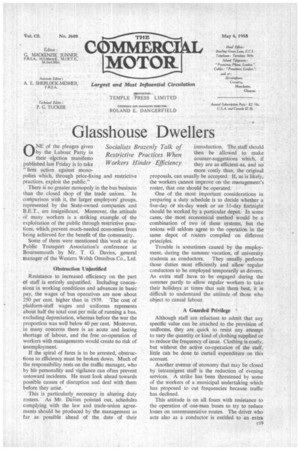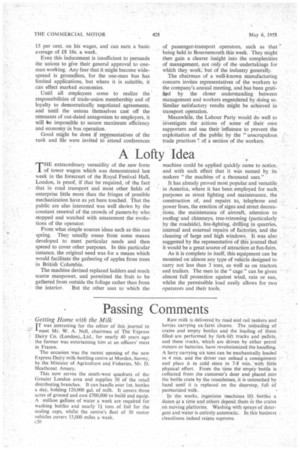Glasshouse Dwellers
Page 69

Page 70

If you've noticed an error in this article please click here to report it so we can fix it.
0 NE of the pleoges given by the Labour Party in their •elfction manifesto published last Friday is to take "firm action against monopolies which, through price-fixing and restrictive practices, exploit the public."
There is no greater monopoly in the bus business than the closed shop of the trade unions. In comparison with it, the larger employers' groups, represented by the State-owned companies and B.E.T., are insignificant. Moreover, the attitude of many workers is a striking example of the exploitation of the public through restrictive practices, which prevent much-needed economies from being achieved for the benefit of the community.
Some of them were mentioned this week at the Public Transport Association's conference at Bournemouth by Mr. T. G. Davies, general manager of the Western Welsh Omnibus Co., Ltd.
Obstruction Unjustified Resistance to increased efficiency on the part of staff is entirely unjustified. Including concessions in working conditions and advances in basic pay, the wages of bus operatives are now about 250 per cent. higher than in 1939. The cost of platform-staff wages and uniforms represents about half the total cost per mile of running a bus, excluding depreciation, whereas before the war the proportion was well below 40 per cent. Moreover, in many concerns there is an acute and lasting shortage of labour, and the free co-operation of workers with managements would create no risk of unemployment.
If the spiral of fares is to be arrested, obstructions to efficiency must be broken down. Much of the responsibility rests on the traffic manager, who by his personality and vigilance can often prevent untoward incidents. He must look ahead towards possible causes of disruption and deal with them before they arise. '
This is particularly necessary in altering duty rosters." As Mr. Daies pointed out, schedules complying with the law and trade-union agreements should be produced by the management as far as possible ahead of the date of their introduction. The staff should then be allowed to make counter-suggestions which, if they are as efficient as, and no more costly than, the original proposals, can usually be accepted. if, as is likely, the workers cannot improve on the management's roster, that one should be operated.
One of the most important considerations in preparing a duty schedule is to decide whether a five-day or six-day week or an 11-day fortnight should be worked by a particular depot. In some cases, the most economical method would be a combination of two Of these systems, but the unions will seldom agree to the operation in the same depot of rosters compiled on different principles.
Trouble is sometimes caused by the employment, during the summer vacation, of university students as conductors. They usually perform those duties most efficiently and allow regular conductors to be employed temporarily as drivers. As extra staff have to be engaged during the summer partly to allow regular workers to take their holidays at times that suit them best, it is difficult to understand the attitude of those who object to casual labour.
A Guarded Privilege • Although staff are reluctant to admit that any specific value can be attached to the provision of uniforms, they are quick to resist any attempt to vary the quantity or kind of clothing supplied or to reduce the frequency of issue. Clothing is costly, but without the active co-operation of the staff, little cah be done to curtail expenditure on this account.
Another avenue of economy that may be closed by intransigent staff is the reduction of evening services. A strike has been threatened by some of the workers of a municipal undertaking which has proposed to cut frequencies because traffic has declined.
This attitude is on all fours with resistance to the operation of one-man buses to try to reduce losses on unremunerative routes. The driver who acts also as a conductor is entitled to an extra 15 per cent. on his wages, and can earn a basic average of £8 16s. a week.
Even this inducement is insufficient to persuade the unions to give their general approval to oneman working. Any fear that it might become widespread is groundless, for the one-man bus has limited applications, but where it is suitable, it can effect marked economies.
Until all employees come to realize the responsibilities of trade-union membership and of loyalty to democratically negotiated agreements, and until the unions themselves cast off the remnants of out-dated antagonism to employers, it will *e impossible to secure maximum efficiency and economy in bus operation.
Good might be done if reeresentatives of the rank and file were invited to attend conferences of passenger-transport operators, such as that being held in Bournemouth this week. They might then gain a clearer insight into the complexities of management, not only of the undertakings for which they work, but of the industry generally.
The chairman of a well-known manufacturing concern invites representatives of the workers to the company's annual meeting, and has been gratified by the closer understanding between management and workers engendered by doing so. Similar satisfactory results might be achieved in transport operation.
Meanwhile, the Labour Party would do well to investigate the actions of some of their own supporters and use their influence to prevent the exploitation of the public by the "unscrupulous trade practices of a section of the workers.




















































































































































































































































